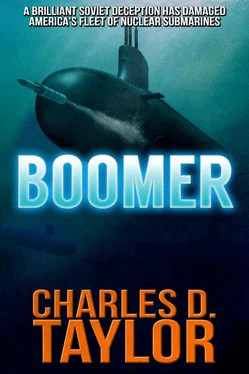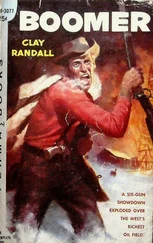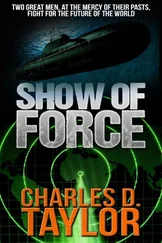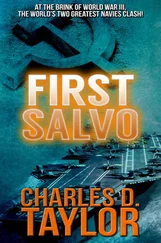Simonds shook his head, looking sadly over the tops of his glasses. “I promise never to lead with my chin again, Chief, if you promise not to tell anyone ashore.”
“Done, sir.” The quartermaster was pleased with himself. “Where do we go from here?” They were approaching Florida’ s sector from the south, and Steel had set his course toward the southwest quadrant.
“For one thing,” Steel answered, “we don’t go charging into the middle of that sector sounding like the local garbage truck. What I want, Chief, is to hang right on the perimeter for a starter. We’re going to spend all our time listening.” He pointed a finger at Simonds. “I’m going to concentrate most of my time in sonar, or at least I’m going to be listening to what they have to tell me. Until we have a solid contact of some kind, you can wander, but let control know where you are. I’m going to turn east on the bottom leg of Florida’s sector and start my coverage counterclockwise. Then we’re going to be more silent than we ever thought of being before. You get someone with a stethoscope to cover every inch of this ship. We’re not going to make a sound.”
It would have been nice to contact Florida to let them know the “good guys” had arrived. But submarines didn’t communicate with each other. They also would most likely have blown their secrecy if an enemy were lurking. Steel was sure Florida had not received a detailed warning, because any interception of such information would hurt them. More than likely, there had been a general message increasing the alert status for all SSBN’s.
Within two hours Manchester had settled on a leisurely course to the east on the lower leg of Florida’ s sector. Her maximum speed never passed ten knots and she varied her depth according to instructions from Peter Simonds until the process became second nature to the watch section. And once they were lulled by this constancy, Steel’s orders were to change their habits. If an enemy submarine were monitoring the surrounding ocean as closely as they were — and that was entirely possible, as far as he was concerned — that submarine’s computers might eventually isolate this distant sound that exhibited manmade habits. And that would change Manchester from the hunter to the hunted. Common sense demanded an uncommon strategy to confuse those computers.
In Manchester’ s sonar, each individual sound in that vast ocean became a possible target. The passage of a noise through the water to a submarine’s listening devices can be affected by any number of peculiarities: the salinity of the water, temperature variations, depth of the source/position of the listening device, physical interference between the two, the chatter of a hull responding to a change in water pressure, marine life forms called biologicals, along with any number of unexplained influences that man had yet to understand. The ability of acoustic engineers to screen out unwanted noise meant that a given sound could be detected at an even greater range. These sounds reached the submarine across a wide frequency band over untold distances, sometimes from ranges so far that changing water conditions might attenuate them before the computers ever had the opportunity to identify the source.
To complicate the situation further, Manchester did not know what their prospective target might eventually be. It could turn up before they located Florida. Ben Steel was searching for an unknown quantity based on information from a SEAL who had parachuted into the Pacific Ocean after a briefing by four senior admirals who knew no more than Steel did.
There was no specific reason for a captain to spend so much time in sonar. Ben Steel just felt comfortable there. His sonar officer, David Hall, was a gem, the chief and his technicians outstanding, and they all understood why he enjoyed kibitzing in the background in that small space chock-full of the most sophisticated electronic gear available. One of the first tales told to new students in sonar school was the value of acoustic intelligence, followed by the “sixty hours of Stonewall Jackson” and her sonar officer, Ben Steel.
As he watched his men at work, occasionally easing a proffered headphone set over his head when a new sound was located, Steel’s thoughts returned to old Stonewall. That had been a wonderful tour of duty, better than anything he might have expected aboard a boomer, and the other officers had been terrific to work with. Her captain, Mark Bennett, had been a mentor, the individual singularly responsible for bringing out the best in him.
He’d bunked with the navigator, Wayne Newell, an NROTC graduate from the West Coast whom he’d known vaguely at nuclear power school. Steel remembered how different the Academy graduates initially found the NROTC types. Ben had always been a good athlete at Annapolis, and he and many of his friends remained frustrated jocks the first few years out of school. It was an Academy disease. The college-trained officers joined in, but their spirit wasn’t the same. The touch-football games weren’t as competitive with the non-Academy officers, nor was the basketball. They hadn’t been instilled with four years of intramurals and simply didn’t take such things as seriously.
On the other hand, Newell had been a company commander at Berkeley and was one of those who became dead serious about that. He wore his uniforms like a second skin. His neat appearance seemed chiseled from granite. Ben Steel’s rough-hewn John Wayne countenance had been a little too raw for that; in that regard, he was the antithesis of the Academy-groomed officer.
Newell had been forgotten after nuclear power school, except for the times Steel had noticed his orders in the Navy Times. Then their paths crossed on Stonewall Jackson. The bunk in Newell’s stateroom had just been vacated. Steel moved in, and they’d gradually grown on each other. It had been a polite relationship during their first patrol, with casual conversations during those few cherished spare moments when they were crowded in the tiny space together. It began with reminiscences of their midshipmen days and comparisons of the differences — Annapolis versus radical California campus — and Steel could laugh now when he realized how stuffy he and his Academy friends had been, about those “outsiders.”
It was their wives who had established a closer relationship. Judy Bennett, as the captain’s wife, hosted monthly teas for the wardroom wives, and the two junior women gravitated to each other naturally. Unlike so many of the others — Navy-oriented women who had met their husbands at Academy dances and married them as fresh-caught ensigns — neither Connie Steel nor Myra Newell were able to identify with the Navy at first. Since neither one had ever spoken that insider’s language, they found pleasure in their own unfamiliarity with this new environment.
Myra Newell had met her husband-to-be at Berkeley. Answering the age-old question of how they’d met each other the first time grew funnier over the years. NROTC was not popular on that campus. The midshipmen drilled on the practice fields because the athletes found them more acceptable than the liberal element that controlled much of the rest of the campus.
Myra was a part-time secretary in the athletic department, working her way through the university. She was the brightest student who had graduated from her tiny northern California high school and the first to be accepted at Berkeley. But she had never had a social life in her hometown because she’d been helping to support her family since the age of fourteen. When the quiet girl with the conservative upbringing appeared in Berkeley, she realized immediately that there was no way she could survive in the free-swinging atmosphere of her more liberal peers. The decision to accept a job in the athletic department was a logical one for her. It was even more natural to be fascinated with the men in the handsome uniforms who were drilling nearby.
Читать дальше












